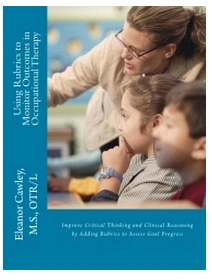Mostly, therapists read my posts on social media and then move on. Some comment positively and others, not at all. But then there are those times when there is that one person who challenges you. I must say, that one person tends to get my fight on! I feel that I have to prove my work all over again. But I really love the debate. To those of you who feel that rubrics are not necessary, that’s okay. However, I feel they are.
Rubrics have been around for a very long time. During my research for my book, “Using Rubrics to Monitor Outcomes in Occupational Therapy“I found that rubrics actually began not in the educational field but in the medical field, decades ago. I feel that rubrics were lost in the shuffle in part due to the changes in the provider/client relationship, moving from power over to power with and ultimately to power through our clients. Now that we are searching for ways to become more ‘client-centered’ as a profession, I feel that transparent, understandable documentation is the key.
It has always been our premise, as occupational therapists, to have our clients engaged in purposeful activity. With the increasing intrusion of third-party payment systems into what we do with our clients and the struggle to become ‘client-centered’ having a method of recording progress becomes increasingly important. Yes, of course, we need to get paid for our work but we also have an obligation to our clients, any one receiving our services.
We all have those people, who question what we do. I am sure that each and every one of us has had this experience. Sometimes we can explain what is going on, through statements based on clinical knowledge, but then there are other times that we need real data. Some challengers will accept the “+” or “-” system of data collection [“+” yes the client was able to perform the task or “-” no the client was not able to perform the task] while

others want more information.
So rubrics offer us a method of documenting some of our thought processing with regard to critical thinking, clinical reasoning and judgment. Sharing rubrics with clients and caregivers provides them with a tool to engage them in the treatment process in a way that is greater than just sharing goals. By encouraging clients to monitor their own progress they become more vested, more engaged and more accountable to themselves and to us, their service providers, ultimately leading to greater gains.
Rubrics may be initially time-consuming to learn and to write, just like any other skill, the experienced therapist will soon be developing rubrics a lightening speed and have at their disposal a wealth of data and documentation supporting our services. In my humble opinion, if a therapist chooses to use or not to use rubrics, it is okay, it’s their decision. I choose to use rubrics, engage my clients in progress monitoring, and have data specifically highlighting the client’s progress. In my opinion, how can I expect my clients to make the best progress if I do not share my expectations with them. I feel that I empower my clients through the use of rubrics, because I want to, not because I have to.

Eleanor, Excellent blog in defense of our responsibility to document progress. It’s not only a good idea, it is the best practice idea.
LikeLike
Thank you Katherine! Your comments are much appreciated as always. I can count on you for great constructive feedback whether or not you agree with my opinions! I am blessed to count you among my treasured colleagues!
LikeLike